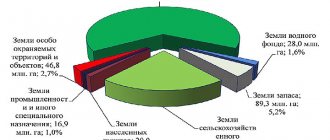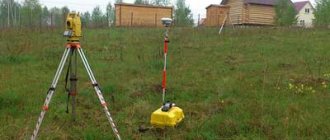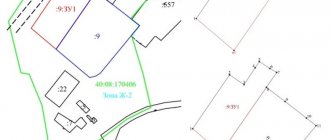In some cases, the owner of a land plot may lose it. In particular, the law provides for the possibility of seizure of a land plot in the following cases.
The first is the seizure of a land plot for state or municipal needs. Land plots are withdrawn for state or municipal needs in exceptional cases. In case of seizure of land on this basis, the property must be redeemed. The repurchase is made at the expense of the Russian Federation, the corresponding constituent entity of the Russian Federation or a municipal entity, depending on for whose needs the land plot is being withdrawn. Decisions on the seizure of a land plot for state or municipal needs are made by federal executive authorities, executive authorities of a constituent entity of the Russian Federation or local government authorities (clause 3 of Article 279 of the Civil Code of the Russian Federation). The owner of the land plot must be notified in writing of the decision made to seize the land plot for state or municipal needs by the body that made this decision (Clause 5 of Article 279 of the Civil Code of the Russian Federation). For the seized land plot, its right holder is provided with monetary compensation. The amount of compensation includes the market value of the land plot and losses caused by the seizure of such land plot, including lost profits. The citizen's right of ownership to the seized land plot is terminated. In accordance with paragraphs 1 - 3 of Art. 281 of the Civil Code of the Russian Federation, if, simultaneously with the seizure of a land plot, the real estate objects located on it and belonging to the right holder of this land plot are seized, the compensation for the seized property includes the market value of the real estate objects, the ownership of which is subject to termination, or the market value of other rights to real estate objects subject to termination. The terms, amount of compensation and other conditions under which the seizure of a land plot is carried out are determined by the agreement on the seizure of the land plot and the real estate located on it (clause 6 of Article 279 of the Civil Code of the Russian Federation). If there is the consent of the person from whom the land plot is being confiscated, the confiscation agreement may provide for the provision of another land plot and (or) other real estate to this person on the terms and in the manner determined by law, with the cost of such land plot and (or) ) other real estate or rights to them in the amount of compensation for the seized land plot (clause 3 of Article 281 of the Civil Code of the Russian Federation). If an agreement on the seizure of the site is not reached, a forced seizure is carried out. Forced seizure of a land plot for state or municipal needs is permitted subject to prior and equivalent compensation. In this case, the terms, amount of compensation and other conditions under which the forced seizure of a land plot is carried out are determined by the court (clause 6 of Article 279 of the Civil Code of the Russian Federation). The second is the seizure of a land plot for the purpose of comprehensive development of the territory. The seizure of a land plot is also carried out if it is located within the territory in respect of which a decision was made on integrated development and an agreement on the integrated development of the territory was concluded with the winner of an open auction for the right to conclude such an agreement (Clause 1 of Article 56.12 of the Land Code of the Russian Federation) . The decision to confiscate a land plot in this case is made by the local government body on the basis of the approved territory planning project and the territory surveying project (Clause 2 of Article 56.12 of the Land Code of the Russian Federation). The local government body sends a copy of the decision and the draft agreement on the seizure of a land plot and (or) real estate to the owner of the land plot within seven working days from the date of the decision on seizure (clause 4, clause 4, article 56.12 of the Land Code of the Russian Federation). In accordance with paragraph 6 of Art. 56.12 of the Land Code of the Russian Federation, an agreement on the seizure of a land plot and (or) real estate must contain, among other things, the redemption price of the seized property and the amount of losses to be compensated in connection with such seizure. If an agreement on the seizure of a land plot is not concluded within a month from the date the draft agreement is provided to the owner of the land plot for review, the seizure of the land plot and the real estate located on it occurs forcibly through the court. In this case, funds in compensation for the seized land plot and the real estate located on it, within seven days from the date of the court decision, are transferred by the person with whom the agreement on the integrated development of the territory was concluded to the bank account of the copyright holder, and in the absence of information about the account — to the notary’s deposit (clauses 9, 11, article 56.12 of the Land Code of the Russian Federation). A court decision to seize a land plot for municipal needs for the purpose of comprehensive development of the territory is subject to immediate execution and can be appealed only in terms of the amount of compensation for the seized land plot and (or) real estate located on it (clauses 10, 13 of Article 56.12 ZK RF). The third is the seizure of a land plot due to its improper use. A land plot may be seized if it is not used for its intended purpose or if it is used in violation of current legislation. In accordance with Art. 284 of the Civil Code of the Russian Federation, a land plot can be seized from the owner when the plot is intended for agriculture or housing or other construction and is not used for these purposes for three years, unless a longer period is established by law. This period does not include the time required to develop the site, as well as the time during which the site could not be used for its intended purpose due to natural disasters or other circumstances precluding such use. A land plot can be seized from the owner if the plot is used in violation of the requirements of the legislation of the Russian Federation, in particular, it is not used for its intended purpose or its use leads to a significant decrease in the fertility of agricultural land or causes harm to the environment (Article 285 of the Civil Code of the Russian Federation). The fourth is the seizure of a land plot by way of requisition. A plot of land can be seized from the owner by authorized executive bodies of state power through requisition. This is only possible in the event of natural disasters, accidents, epidemics, epizootics and other circumstances of an emergency nature. It is worth noting that requisition implies the temporary nature of the seizure, and if the seized land plot cannot be returned, then the owner will be paid its market value or, at his request, will be provided with an equivalent plot in another location (Article 242 of the Civil Code of the Russian Federation). Fifth - confiscation of a land plot. A plot of land can be withdrawn (confiscated) from the owner free of charge by a court decision in the form of a sanction for committing a crime (Article 243 of the Civil Code of the Russian Federation).
The concept of confiscation of land
According to Article 50 of the Land Code of the Russian Federation, confiscation of a land plot is the seizure of real estate from a person by court decision. However, such withdrawal is possible only in favor of the state and only in cases where the citizen has committed certain crimes or violated current legislation.
The Land Code does not stipulate anything about the confiscation of land, but there is a reference to the current Criminal Code of the Russian Federation, which spells out crimes for which court decisions in the form of confiscation can be made and what confiscation is in general.
Legislative framework on the issues of confiscation of land
Forced gratuitous confiscation of land is regulated by several legal acts:
- Land Code of the Russian Federation;
- Civil Code of the Russian Federation;
- Criminal Code of the Russian Federation;
- Criminal Executive Code of the Russian Federation.
And this is not a complete list, since there are many more federal laws that stipulate the procedure for the seizure of real estate for one reason or another. However, only one thing remains unchanged - this process occurs only by court decision. This decision can be appealed to higher courts.
The legislation provides for several options for the alienation of a land plot:
- for municipal or state needs;
- in case of inappropriate use of land;
- for complete and gratuitous confiscation;
- for requisition (temporary seizure).
According to the current land legislation, the owner of a land plot has not only rights, but also obligations. In particular, the purpose of land use.
So, for example, land intended for agricultural needs, when used for private buildings, can be confiscated free of charge, that is, the owner will not receive any material confiscation.
Seizure of a land plot during collection of obligations and for grave and especially grave crimes
According to Article 237 of the current Civil Code of the Russian Federation, it is possible to seize the owner’s property (including a land plot) when applying for collection of obligations. In this case, the case is considered by the court, after which a decision is made that must be executed. If this does not happen, then the decision is executed by bailiffs, who “communicate” with the former owner.
Criminal legislation provides for the confiscation of the property of a person convicted of grave and especially grave crimes, the purpose of which was to obtain ownership of the property.
If a person killed or maimed (caused serious bodily injury) another person in order to take possession of his property (including land), then the court is obliged to confiscate this property in favor of the victim. Article 104.1 of the Criminal Code of the Russian Federation describes in detail all types of crimes for which, in addition to the main punishment, gratuitous confiscation of property is also charged.
The procedure for confiscation of a land plot
First of all, the citizen receives a corresponding summons to a court hearing, where the case of confiscation or alienation of ownership of a land plot will be considered. If the concept of misuse of land is used as an argument for confiscation, then the owner of the plot must first be notified by local government authorities.
If the owner of the site did not receive the notice, then he has the right to file a counterclaim against representatives of local government bodies.
However, this is not a basis for overturning a court decision, which states that the land plot should be confiscated.
Such a decision can only be appealed to higher courts. A citizen has the right to protect his interests in court, since this is guaranteed to him by the Constitution of the Russian Federation.
The decision to confiscate land is made two months before the actual confiscation. It states:
- grounds for confiscation (seizure);
- the owner of the land plot from whom the plot is being seized;
- area, cadastral value and cadastral number of the land.
The absence of at least one of these points is grounds for immediately challenging the legality of the resolution. Within seven working days after the owner familiarizes himself with the resolution, the public executive body independently notifies all relevant authorities that the owner of the land plot has been deprived of it through confiscation.
As a result, all title documents must be redone, and the rights to use, inherit, sell and lease the site for the former owner are terminated.
Author of the article
Cases of land confiscation
Depending on the reason for which the land plot is alienated, both federal authorities and local governments can participate in the process.
For example, if the court found that the land was not used by the user or owner for its intended purpose (a store or public institution was opened instead of building a private house), then confiscation will be carried out by representatives of local government, provided that the specific land plot was on their balance sheet .
If a person did not use federal land for its intended purpose, then the court may make a decision to confiscate such a plot of land in favor of the state for its needs.
Most often, farmers whose business is unprofitable or unprofitable face such situations. Sometimes the court, instead of confiscation free of charge, in such cases offers an alternative in the form of requisition of land or redemption at cadastral value.
According to Article 49 of the current Land Code with its latest amendments, a land plot can be confiscated or withdrawn from the owner by court decision in cases where:
- it is necessary to comply with the country's international obligations;
- it is necessary to use the site for the construction of highways of municipal, intermunicipal, and federal significance;
- it is necessary to locate on this plot of land or use nuclear energy facilities;
- national defense and state security facilities are located or are expected to be located on the site;
- Electricity, gas supply, water supply and other facilities are or will be located on the site in the future.
In addition, each subject of the federation has its own federal laws, which may also prescribe rules according to which a land plot can be confiscated in favor of the state for its needs.
However, this does not mean that the person is left without any compensation, since this is a violation of his rights and freedoms as a citizen of the Russian Federation. In some cases, representatives of executive authorities or local governments offer the purchase of a plot on a general basis, but only at the cadastral value.










